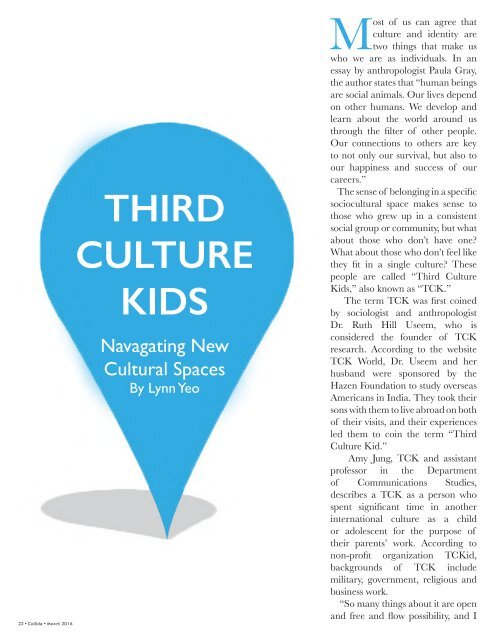Collide Issue 30: The Middle
You also want an ePaper? Increase the reach of your titles
YUMPU automatically turns print PDFs into web optimized ePapers that Google loves.
22 • <strong>Collide</strong> • March 2016<br />
THIRD<br />
CULTURE<br />
KIDS<br />
Navagating New<br />
Cultural Spaces<br />
By Lynn Yeo<br />
Most of us can agree that<br />
culture and identity are<br />
two things that make us<br />
who we are as individuals. In an<br />
essay by anthropologist Paula Gray,<br />
the author states that “human beings<br />
are social animals. Our lives depend<br />
on other humans. We develop and<br />
learn about the world around us<br />
through the filter of other people.<br />
Our connections to others are key<br />
to not only our survival, but also to<br />
our happiness and success of our<br />
careers.”<br />
<strong>The</strong> sense of belonging in a specific<br />
sociocultural space makes sense to<br />
those who grew up in a consistent<br />
social group or community, but what<br />
about those who don’t have one?<br />
What about those who don’t feel like<br />
they fit in a single culture? <strong>The</strong>se<br />
people are called “Third Culture<br />
Kids,” also known as “TCK.”<br />
<strong>The</strong> term TCK was first coined<br />
by sociologist and anthropologist<br />
Dr. Ruth Hill Useem, who is<br />
considered the founder of TCK<br />
research. According to the website<br />
TCK World, Dr. Useem and her<br />
husband were sponsored by the<br />
Hazen Foundation to study overseas<br />
Americans in India. <strong>The</strong>y took their<br />
sons with them to live abroad on both<br />
of their visits, and their experiences<br />
led them to coin the term “Third<br />
Culture Kid.”<br />
Amy Jung, TCK and assistant<br />
professor in the Department<br />
of Communications Studies,<br />
describes a TCK as a person who<br />
spent significant time in another<br />
international culture as a child<br />
or adolescent for the purpose of<br />
their parents’ work. According to<br />
non-profit organization TCKid,<br />
backgrounds of TCK include<br />
military, government, religious and<br />
business work.<br />
“So many things about it are open<br />
and free and flow possibility, and I


